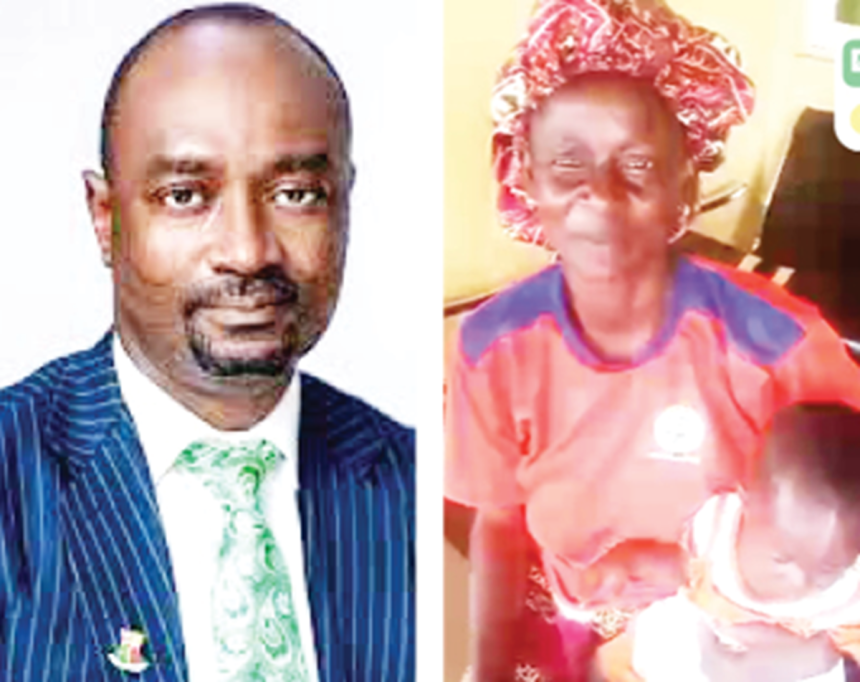•How ward development committees are boosting health uptake in Oyo State
Mama Ajenifuja, supported by her child, walked into the PHC at Iyaji in Oyo State. Due to her extreme weakness, her child had to push her about the centre in a wheelchair.
“I came to the hospital with ₦4,000 tied to the edge of my wrapper. I paid N1000 for registration but was unable to pay for the other tests, like the X-ray. A lady intervened, and through the Basic Health Provision Fund (BHCPF) care insurance, I had all the tests and medicines,” recounted Mama Ajenifuja.
Mama Ajenifuja did not hesitate to visit the Primary Healthcare (PHC) in Iyaji for medical attention. Ward Development Committee members have been promoting free medical care, necessary medical services, medications, and immunisations in the government-renovated PHCs throughout Oyo State.
Two-time mother Mrs Azeezat Adekunle gave birth at PHC Ladindin in Oyo West Local Government. The immunoglobulin injection must be given to the newborn. Since she had little money, she was afraid that the baby would die.
“I enjoyed free healthcare service during the pregnancy and delivery. But when the nurse told me that my new baby will also need the immunoglobulin injection, I started to cry. I struggled before I could buy the injection after having my first baby,” said Mrs Adekunle.
Mrs Adekunle, all full of smiles at the Ladindin PHC, expressed her gratitude that under the BHCPF her baby received the immunoglobulin injection free of charge.
The BHCPF is a direct financial investment that funds PHC to improve the quality of services; it was designed to guarantee fair and equal access to a fundamental set of healthcare services particularly for vulnerable populations.
Observing Mrs Folasade Abel at Agunrege PHC in Atisbo LGA with a 7-month-old twin and another 2-year-old infant made her vulnerability clear. She delivered the twins by caesarean section at the General Hospital in Ago-Are. At the revamped Agunrege PHC, she benefitted from free antenatal care, including tests and medicines.
“My husband is not too supportive, so imagine what would have happened if I had to pay for a caesarean section out of my pocket,” she said.
Twenty four year-old Kayode Kehinde also felt tremendous relief at the delivery of his baby at Owode PHC in Ibadan South East LGA. His wife has a normal delivery.
The new father, full of joy and sitting in the clean ward of the Owode PHC, declared, “We were treated well and not stressed in any way.”
Oyo State government is encouraging active community engagement in its revitalised and updated PHC facilities throughout the state to improve and provide sustainable health services with full participation of people at the grassroots level. The PHC system is the cornerstone of the national health system.
Ward development committees have been used by the Oyo State administration in recent years to mobilise communities to take action on mother and child health. Increasing patronage of health services at the PHC is vital to reducing maternal and infant mortality rates.
The Ward Development Committee (WDC) Chairman of Molete PHC and Boluwaji PHC, Alhaji Kolawole Bakare, acknowledged that WDC members are now more involved in the day-to-day operations of PHCs in Oyo State and that this has increased trust between the communities and the PHCs established throughout the state to deliver healthcare at the local level.
“Now that we have been given more authority, we remain at the PHC to supervise the treatment of our people. If someone is mistreating patients, we can stop them or report them to the supervising physician,” he said.
He said with the renovation of the PHCs, it has been easier to talk and convince people in the community to patronise the health facility for health care services.
According to him, back then the patronage of traditional birth attendants was more due to poverty and the dilapidation of the health centres.
“Some women in labour arrive at the medical centre with nothing except the clothing they are wearing; they are not sent home. The nurses typically call us to assist with their care and to track down their family members,” Alhaji Bakare stated.
According to the Nigeria Demographic and Health Survey in 2018, a substantial percentage of women in Oyo State, and Nigeria as a whole, start childbearing at a young age. Some give birth as teenagers. A significant portion of women, especially those in rural areas, give birth before the age of 19.
Health facilities are less likely to be used by women who give birth before the age of twenty. The risk of problems during labour is increased by the lack of facility-based births, underscoring the necessity of focused interventions.
Alhaji Bakare said many of the women in labour who came to the health facility empty-handed were teenagers or without support from their spouses.
“You can imagine a 13-year-old getting pregnant; we cannot stop these pregnancies. That is why when at the PHCs cases like that come, the health workers put a call to us to support their care,” he added.
However, Alhaji Bakare said more needs to be done to ensure that there was no drug stockouts in primary healthcare facilities.
“By the end of a few weeks, the drugs supplied would have been exhausted. Our work as WDCs is to invite people in the community to patronise the PHCs, and tell them that there are free healthcare services. However, after exhausting drug supplies, they have to go out to fill their prescription.
“Yes, nurses abusing women that come to deliver has stopped; now we are always around the facility to ensure nobody is abused. Anyone that wants to misbehave is reported to the doctor. It was not so before. But more money needs to be put into purchasing more medicine for patient care.”
Mrs Afusat Agboola, a 70-year-old WDC member attached to Mapo PHC, said turnout at PHCs and health interventions like mass vaccination has increased because, as representatives of their communities, they always look for the good of the people that elected them.
“It is easily influencing them because I also belong to that community; I always take time to explain to them, so responses to different issues like vaccination are good,” she said.
According to Mr Biliaminu Jimoh, the WDC chairman at Agbogbon PHC, the people are constantly reminded that health is wealth and that they should take advantage of the free medical services offered in PHCs in Oyo State, even in the face of obstacles like the community’s insistence that they would prefer to give food.
Mr Jimoh, “I tell them that since their children started being vaccinated, the incidence of children falling sick and being rushed to the hospital has reduced. Vaccination is not the same as rice; if a person is sick, no delicacy provided will be taken or appreciated.”
With all in place at the Agbogbon PHC, Mr Biliaminu said there is no day that a child is not born in the health facility. Delivery is also possible at night because they run shift services, and night guards and vigilante guards man the facility.
Mrs Esther Ayanmo Folakemi, a community health practitioner who has worked at the Ibadan South East Health Board for over 13 years, attesting to healthcare facilities at the grassroots, said even referrals to the general hospital where needed have been reinstated.
“In case of emergencies during childbirth, we can refer immediately. We have one functional ambulance in Ibadan South East with a driver attached on standby to convey such women to Adeoyo Maternity Teaching Hospital for emergency care, both for the mother and newborn.”
ALSO READ FROM NIGERIAN TRIBUNE: Tinubu signs 51 out of 2,263 bills into law in two years
Mrs Ayanmo acknowledged improvement in services at health facilities now across the PHCs in the state, especially with the recent mass recruitment of different cadres of health workers by the Oyo State Primary Healthcare Board.
Mrs Fatiat Ayoade, a nursing officer and the maternal and child health officer for Ibadan South East Local Government, corroborated instances of women in labour brought in with no money or basic items required for delivery and are then supported through the Basic Health Provision Fund.
She added, “We have the phone numbers of the WDC members. They are closer to them at the community level. They go out in search of the woman’s relations in the community to bring them over to the facility.”
Nevertheless, she said many women coming for antenatal care miss their appointment and therefore miss out on daily folic and iron tablets (haematinics) and medicine to prevent malaria in pregnancy (intermittent preventive therapy) as well as health education on the importance of sleeping inside insecticide-treated bed nets.
According to her, contacts are made with such women using the phone numbers of their husbands written in their hospital case notes to come for haematinics and medicine to prevent malaria in pregnancy.
She said many women lack the understanding of the benefits of haematinics and medicine to prevent malaria in pregnancy to ensure they have fewer complications in pregnancy and healthy babies.
“I have seen a husband who followed his wife to the clinic to complain that the pregnant wife did not use her folic acid and ferrous tablets but hides them under the bed. She died not understand the implication of her action.”
The ferrous tablets raise the iron level necessary for brain development and prevent low blood volume (anaemia) during pregnancy, while the folic acid aids in the prevention of birth abnormalities. Pregnancy complications can arise from anaemia and malaria, both of which are quite serious.
Mrs Ayoade, however, said cases of teenage mothers seen at the health facilities require increased adolescent health education in the community.
Teenage pregnancy comes with many challenges, including unsafe abortion and the inability to care for their babies when born.
Executive Secretary of the Oyo State Primary Health Care Board, Dr Muideen Olatunji, said that the Oyo State government is using its rejuvenated and upgraded PHC centres to assure safe motherhood, healthy children, and eventually universal health care for everyone.
He claimed that in order to guarantee access to life-saving interventions like vaccination, vitamin A supplementation, skilled birth deliveries, family planning services, and nutrition counselling, easy access to operational and comfortable PHC centres for mothers and children in each political ward has been given top priority.
According to him, the state has already repaired and updated 212 PHCs to have at least one operational and comfortable PHC centre for every parliamentary ward.
“The renovations of the others will be finished in the upcoming months. To lower mortality and infant mortality, we have also reasonably outfitted 264 of those facilities,” he added.
Also, Dr. Olatunji, stated that in addition to equipment, the PHCs receive monthly medicine supplies and a quarterly payment of N301,000 to each flagship PHC facility to help with day-to-day operations.
“At saturation point, it reached a reasonable level of about ₦40 million worth of drugs that are supplied to those facilities each month, compared to the initial consignment of drugs for the facilities, which was worth about ₦80 million,” he declared.
He said the ultimate goal will be a drug-revolving scheme to ensure no drug stockouts in these facilities.
Dr Olatunji added that many women and children, particularly the indigent ones, were also enrolled under the state’s health insurance scheme at the PHCs across the state to ensure that no one is left behind.
Regarding health manpower, Dr. Olatunji stated that at least 3,903 workers were hired with the hope that they would give high-quality healthcare services in order to lower maternal and newborn mortality.
“To make sure that the immunisations for common childhood diseases reach every corner of the state, we are supporting their distribution. We are also helping to raise awareness among mothers about how to make sure that their children are receiving enough nutrition. To be able to offer these services at the primary care level throughout the state, more than 1,000 people received training.”
He claimed that the members of the Ward Development Committee had been bolstered and motivated to collaborate with healthcare practitioners to prevent delays, which are the cause of deaths and difficulties that occasionally occur during birth.
“At these health facilities, now the chance that there are no health personnel to attend to patients is not likely to happen. We’ve provided a telephone for each of the facilities. Now, clients can call those facilities before they get there.
“Even when they get there, if they can’t see the provider, they can call. And the provider will meet them at the facility or tell them what to do. You could see that this brings confidence and brings synergy between the client and the providers.”
He also declared that through the alliance formed with neighbourhood transporters, in collaboration with WDC members and health facilities, transportation for pregnant women in labour has been made easy. This augments ambulances refurbished for each local government health council.
Ward Development Committees (WDCs) play a major role in improving the efficacy of Primary Health Care (PHC) in Nigeria. The experience of women and children in Oyo State receiving free, high-quality treatment is proof that their active participation in the management of health facilities has improved health outcomes.
WATCH TOP VIDEOS FROM NIGERIAN TRIBUNE TV
- Let’s Talk About SELF-AWARENESS
- Is Your Confidence Mistaken for Pride? Let’s talk about it
- Is Etiquette About Perfection…Or Just Not Being Rude?
- Top Psychologist Reveal 3 Signs You’re Struggling With Imposter Syndrome
- Do You Pick Up Work-Related Calls at Midnight or Never? Let’s Talk About Boundaries







